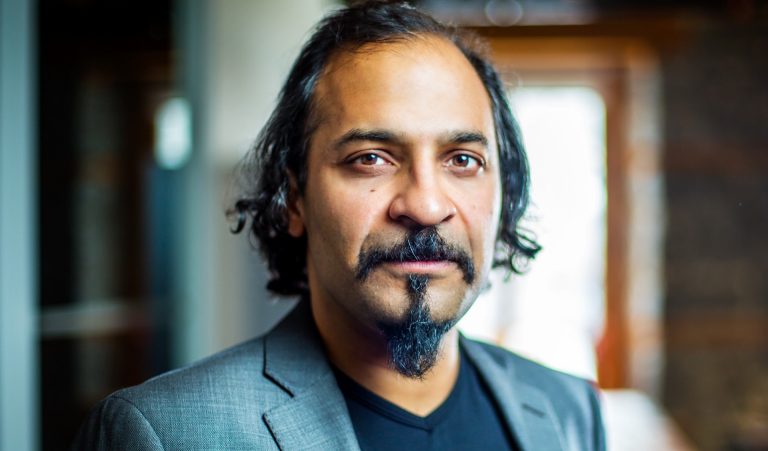Free Concordia-based online course tackles violent extremism

For the past four years, Project Someone has used educational interventions and collaborative works to help prevent online and offline hate speech that can lead to violence and extremism. The initiative was co-founded by Vivek Venkatesh, associate professor in Concordia’s Department of Art Education.
On May 4, the project is launching From Hate to Hope: Building Understanding and Resilience, a massive open online course (MOOC) that will explore hatred and its various causes.
Participants will learn about the ways people are sometimes manipulated into hating targeted groups. The free course runs for five weeks.
From Hate to Hope will promote understanding and resilience through dialogue and critical thinking. However, students will not only be encouraged to dialogue and practice mutual understand and tolerance. They will learn how to help foster public and online spaces that are conducive to openness and healthy interpersonal communication.
The course is co-taught by Venkatesh and Jihan Rabah, co-principal investigator at Project Someone. It also features a broad spectrum of guest presenters and interviewees, including researchers and even some former members of extremist groups.
The course will also serve as a module in a for-credit, UNESCO Summer Institute graduate course hosted through Concordia in June, (Re)imagining the Prevention of Radicalisation and Violent Extremism.
Digital citizenship
One of the thematic focuses of the MOOC is the online propagation of hate. Students will learn about social media and digital citizenship. They will study ways in which online platforms can be used to promote hate, but also to challenge it.
The MOOC will also address important topics such as fake news, filter bubbles and other problems especially prevalent in the digital world.
For their final assignment, participants will create and share educational or strategic materials, adapted for use in their own institutions and communities. The goal is to produce concrete solutions to addressing hate.
Trilingual and international
Among its objectives, Project Someone is committed to helping develop and evaluate tools to counter extremist violence in Lebanon. In recognition of this commitment, the group received support from Global Affairs Canada to develop the MOOC and other projects.
Working with colleagues in Lebanon, and following this commitment, the course is being organized in three parallel streams, one in Arabic, one in English and one in French.
Participants will follow the course in their chosen language, but will have the opportunity to interact and discuss with participants in the other linguistic streams using translation software.
Over 100 students from around the world are already registered for the course and more are expected to join.
Although development of the course began long before the current health crisis and physical distancing measures, it takes advantage of the online format at an auspicious moment.
“Physical togetherness, gathering in physical spaces and face-to-face interaction have always been an important part of our work,” Venkatesh says. “At the same time, I’m not sure we’ve ever had a project with the potential to reach as many people as this course might.”
Introduction from Someone Project on Vimeo.
Real dialogue
Although Venkatesh is excited about reaching a broader audience, this is not the only reason the course was made to be trilingual and global. These elements reflect a conscious effort to provide participants with the unique opportunity to engage others with radically different experiences and perspectives.
Venkatesh, who is also a UNESCO Co-Chair in Prevention of Radicalization and Violent Extremism, elaborates. “The course is not simply about delivering ready-made content to students like consumers. That would defeat the purpose,” he says.
“I don’t even like to refer to them as students so much as participants. Participants will have the chance to hear from people with all sorts of unique perspectives, and they will share their own experiences and thoughts as well,” he adds.
“It is an opportunity to practice the very sort of dialogue that we are trying to encourage. The real ‘aha!’ moments of the course are going to come about in conversation.”
Feminist pedagogy and course design
Kathryn Urbaniak, program manager at Project Someone and lead designer of the course, describes the pluralist, feminist pedagogical model behind it.
“Project Someone is committed to gender equality. As part of our basic mandate, we’re invested in giving voice and agency to women and members of minority groups,” she says.
This is seen in the healthy representation of women among the designers and developers of the course. The main team was composed of five women from Concordia.
Although participants in the course may not notice any explicitly feminist component, adds Urbaniak, it is evident in the very design of the course.
“Traditional pedagogies tend to be hierarchical. They’re top-down. Feminist pedagogies aspire to be non-hierarchical. We’ve designed the course such that responsibility for the content and delivery is shared,” she explains.
“Designers, instructors, presenters, interviewees and the participants themselves — who will share their thoughts and experiences with one another — will contribute to the course and help build their understanding together.”
Who needs this course?
“I like to think that the M in MOOC stands for meaningful rather than massive,” Urbaniak says. “The measure of success wouldn’t be that a thousand people have completed the course. We’d be happier if only 100 people completed it but had meaningful interactions and were really affected.”
The online course is geared toward social workers, educators, mental health workers and anyone involved in policy-making. But it’s open to all — which is especially relevant given the extent hate affects all communities and how everyone must take responsibility in addressing it.
Find out how to register for the free Concordia-based massive open online course, From Hate to Hope: Building Understanding and Resilience.


